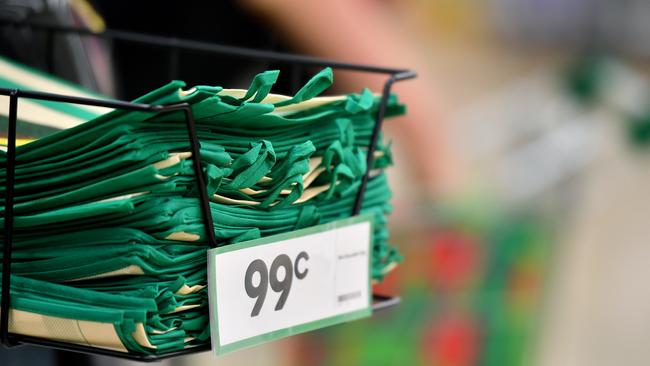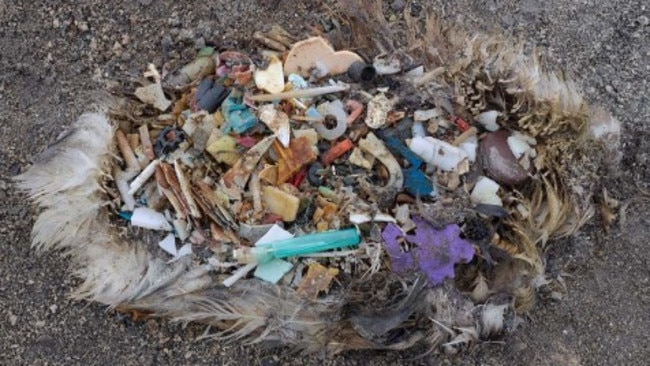What if conscious consumerism is a big, fat lie
THE sustainability movement is one for the privileged, writes Jane Fynes-Clinton. And often the solving of one problem just creates another.

Rendezview
Don't miss out on the headlines from Rendezview. Followed categories will be added to My News.
TIMES are tough for conscious consumers.
Fair trade, environmentally friendly, local, non-GMO, sustainable: the pressures are enormous to try to reduce our impact, minimise harm and tread more lightly on the earth.
We have been told the looming single-use plastic bag ban is a win.
It officially starts at the month’s end in Queensland and Western Australia, meaning only NSW is still left bagging unfettered.
Of course, the big supermarkets are jumping the gun because they are keen to be seen to be green.
The ban includes compostable, degradable and biodegradable bags because despite what we were told for years, they break down in the environment in the same way as conventional plastic shopping bags and can still harm the environment and wildlife.
But barrier bags, the filmy little numbers provided for unpackaged perishable food such as those in the fruit and veg section, will not be banned. Neither will dog poo bags, those for nappies, or the heavyweight store bags.
Go figure.

Australians dump nearly 15000 tonnes of plastic into our oceans each year, and we are a small player compared to more heavily populated, less aware nations such as those in Asia.
Plastic straws and bottles are bound to be next, but it is hard to imagine the giants such as Coca-Cola being brought to heel completely, and those of us filled with the fire of protest are unlikely to completely boycott products we love.
We have created this change. Consumers vote with their dollars and governments and industry have been forced to listen. Or so we think and hope.
Ethical consumerism as a phenomenon appeared out of nowhere about 15 years ago, with consumers in developed countries increasingly demanding that their food had to be more than merely sustenance or a tummy filler.
But the sustainability movement is largely one for the privileged. A hefty portion of disposable income is needed to afford ethical and sustainable consumption options.
It is a luxury to reject the lion’s share of products on offer on animal welfare, pollution or child labour grounds.
Leisure time is needed to research products’ environmental footprints before purchase and to Google ingredient labels to understand the true meaning behind the numbers and science speak.
Assessing true sustainability should take into account life cycle, from the energy taken to extract and process raw materials, to supply chains and distance travelled. It is heady stuff.
But what if all this conscious consumerism is a big, fat lie? What if it makes a mere iota of difference if at all?

Conscious consumers believe that every purchase is a moral act, an opportunity to vote with our dollars for a better world.
We believe that if we are given information, most of us will make better, more eco-friendly choices.
We are told that if we don’t like what a company is doing, we should stop buying their products and force them to change.
But that only goes so far.
Making small, ethical purchasing decisions must be teamed with agitating for change to companies’ unsustainable business models and the government to mandate better practices, as they may have done with the plastic bag sanctions.
Quickly bringing about the changes we want and the world needs is thwarted partly because consumption is the backbone of our economy.
A massive portion of our GDP is based on household consumption. The systems, markets, government, institutions are wired to stimulate rampant consumption. We are constantly told we have new needs we did not know we had.
Maybe we should just be glad to be on industry radars at all.
The recent Beef Australia gathering in Rockhampton dedicated a session to how graziers, processors and retailers could respond to consumer and environmental activist concerns about the history of beef including animal welfare and environmental sustainability.
It was noted there that there was an increasing demand for food produced close by to increase traceability and reduce the carbon footprint of foods that are often trucked across the country.
But wait: there is more.
Woolworths group chief executive Brad Banducci this week said the big four customers concerns were food waste, reducing plastic, a sustainable supply chain and energy efficiency.
It seems ironic then that the announcement this week by Coles and Woolies that they intend to cease the double plastic wrapping of small portions of produce may well mean more rotten fruit and veges, and the impact of food waste on the world is greater than the impact of plastic by most measures.
So while we conscious consumers should chalk up the partial plastic bag ban as a victory, we should continue to agitate for bigger changes that cause more pain for us but ease pressure on our planet.
The alternative is to do nothing, and that is no choice at all.
Dr Jane Fynes-Clinton is a journalist and lecturer at the University of the Sunshine Coast.


